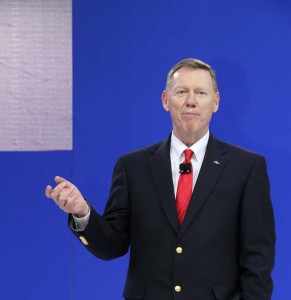Citing what he described as the ongoing manipulation of its currency, Ford Motor Co. CEO Alan Mulally said he does not want to see Japan allowed to enter into a new round of Asia-Pacific free trade discussions.
Mulally and other Detroit industry leaders have been pushing to prevent their primary Asian rivals from benefiting from proposed measures that would expand, among other things, automotive trade in one of the world’s fastest-growing regional markets.
The Ford chief executive laid out some fierce criticism of Japanese economic policies, pointing out that the yen has slid about 8% against the American dollar since the beginning of the year, something that he and other critics don’t feel is justified by current economic conditions.
Mulally, a former Boeing senior executive, also expressed his frustration during a stop in Bangkok over what he felt was Japan’s ongoing efforts to restrict foreign automobile brands, calling the country, “the most closed automobile market in the world.”
Japan’s new Prime Minister Shinzo Abe recently expressed his desire to enter into the regional free trade talks, but first, declared Mulally, “They should open up their market, they should restructure their industry, and that’s why we’re encouraging the people negotiating the free trade agreements that they deal with that.”
The Japanese have long insisted that their home market is not closed to foreign auto manufacturers, insisting the issue is one of consumer preference to domestic brands. Whatever the reason, makers from Europe, the U.S. and South Korea have barely ever collectively achieved more than about a 10% stake in Japanese new vehicle sales. That’s one of the lowest percentages of anywhere in the world.
The Japanese yen has often been cited as a cause for concern, Detroit makers focusing on what they contended was a lopsided exchange rate for much of the 1980s and ‘90s. But makers like Nissan and Toyota have turned the tables over the last several years, calling exchange rates that dipped below 80 yen to the dollar unjustifiable and unsustainable. It has led a number of Japanese makers to shift major portions of their production base off-shore, including to the United States.
As recently as October, the yen lagged below 80 but is now running in the mid-90 range, an unusual rapid reversal that critics like Mulally directly blame on inappropriate government intervention. Nonetheless, Japanese makers insist it is still difficult for them to justify home-market production for many products at a rate lower than 100 yen to the dollar.
Negotiators hope the regional trade talks could see a deal by the end of 2013, though the dispute over Japan could slow the process. Among the current participants are the U.S., Canada, Mexico and Australia along with a number of Asian nations.
Mulally’s stop in Thailand was no coincidence. It has been the maker’s center of manufacturing for the ASEAN region for nearly two decades, its plant near Bangkok capable of turning out nearly 500,000 vehicles annually.

